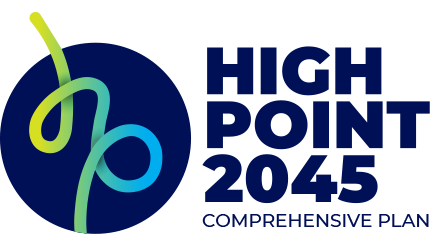1. Create an incentive package for the redevelopment or development of all identified activity centers
Strategy Actions
The activity centers discussed in the Growth Framework section will require more than new zoning regulations to allow for mixed-use development and significantly reduced setbacks. A public-private partnership approach will absolutely be necessary to realize the desired mixed-use development in the activity centers – the private sector will not lead this effort without public incentives. The city has had a series of successful projects in the downtown area – Truist Point ballpark, Congdon Yards, etc. – using a similar partnership approach in conjunction with a toolbox of economic incentives. It should be emphasized that development, and redevelopment in particular, can be messy. It is not a linear process but rather a series of hits and misses which mandates a complete set of incentives available from the city.
The following tools should be deployed for use in all activity centers, in particular for those designated activity centers that will require redevelopment.
- “Synthetic” Tax Increment Financing (TIF)
Tax increment financing is a mechanism for capturing the future tax benefits of real estate improvements, in order to pay for the present cost of those improvements. It can be used to channel funding toward improvements in distressed or underdeveloped areas where development would not otherwise occur. North Carolina does not allow for “typical” TIF districts but many jurisdictions use “synthetic” TIF.
According to Kara Millonzi who wrote the following in an article for the Coates’ Canons NC Local Government Law: legally there is no difference between a “regular” tax increment financing district and one that is referred to as a “synthetic” TIF. The use of the term “synthetic” TIF is basically a marketing strategy. It is a transparent way to indicate that a NC city intends to repay the loan using new revenue generated from increased property values due to new development in the area, rather than from existing revenue or from new revenue generated through increased property tax rates.
Many developers understand TIF and are accustomed to working with cities that offer this financing tool. “Synthetic” TIF district designation for the activity centers would allow the City of High Point to compete for developers that have come to expect this incentive.
- Redevelopment Area Designation as a Development Financing District (DFD)
Chapter 160A, Article 22, of the North Carolina state code allows cities to create a redevelopment commission that has the authority to assess properties for designation as a redevelopment area subject to their review of site-specific criteria. The Planning and Zoning Commission is required to review the redevelopment commission’s recommendation and certify that the area in question is in conformance with the comprehensive plan and then recommend to the City Council for final approval. Any proposed development financing tools or instruments must be approved by the state’s Local Government Commission. The designation of the activity centers in this comprehensive plan makes this process relatively straightforward for the Planning and Zoning Commission and City Council.
The benefits of redevelopment area designation include bonding authority for infrastructure or land acquisition and the use of any allowable debt financing instruments available to the city. This gives the city considerable flexibility to partner with a private land owner or developer financially.
Cities are limited to a maximum of 5% of their land area that can be designated as Development Financing Districts. The seventeen activity centers equate to approximately 1,000 acres of land or +/-3% of the City’s land area (excluding rights-of-way) and, therefore, meet this threshold.
- Municipal Services District (MSD)
Municipal Service Districts are special tax districts that are allowed under state legislation. The High Point City Council, in coordination with the property owners in the activity center, can approve a tax increase for the defined activity center. The additional tax revenue can be used to fund improvements to public right-of-way areas and other projects determined by the activity center’s property owners. Projects could include unique lighting, gateway signs, landscaping, etc. – things that generally enhance the character of the activity centers and that are not normally
Implementation Timeline for this Strategic Initiative
Success Measures
Target Year/Range
New TIF, DFD, or MSD designations created for select Activity Centers to spark new development/redevelopment
2030
Increased number of development/redevelopment projects occurring in Activity Centers
2030
Strategic Initiatives for this Priority
Strategic initiatives refer to carefully planned actions or projects that the city will need to undertake to achieve this plan’s desired outcomes for each of the Big Things.
Learn more about these and other Strategic Initiatives in Our Way Forward
